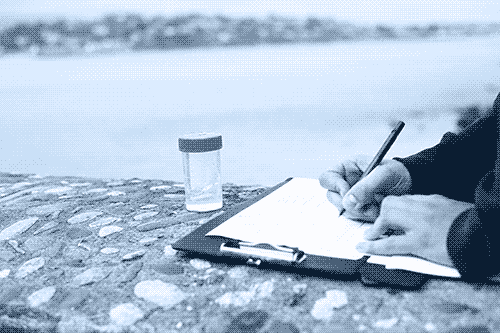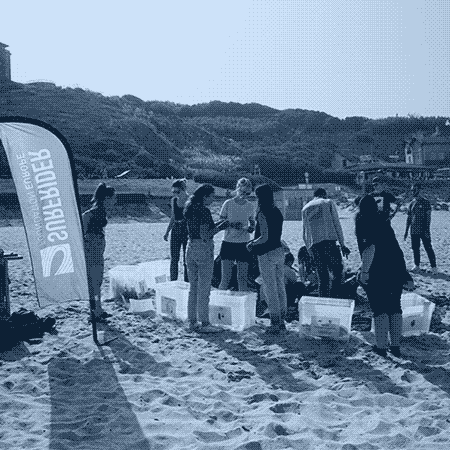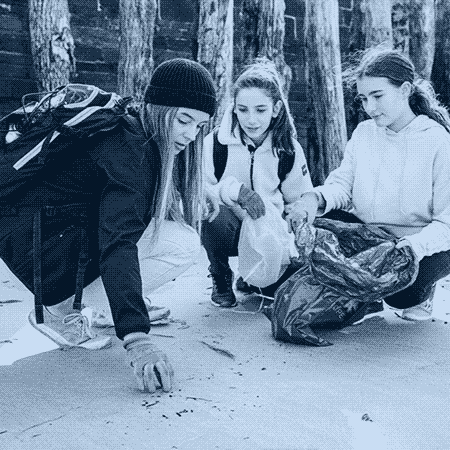Data collection
Citizen science to protect our oceans
Monitoring, or data collection and tracking, is essential for Surfrider in the fight against water pollution. The information gathered then helps to alert decision-makers and propose concrete measures.

Collecting data to improve
our knowledge of the environment
Monitoring, or ‘data tracking’, is the continuous and systematic surveillance of a specific environment, parameter or phenomenon to detect changes or trends over the long term.
At Surfrider, this monitoring is based on data collection carried out with local stakeholders to identify sources of pollution, enabling us to work with local authorities to protect the environment and public health.
The waste collected reveals the types of products causing problems and makes it possible to trace them back to their source. Bacteriological analyses, meanwhile, highlight malfunctions in collective sanitation systems, while chemical data identifies industrial discharges and residues from consumption (such as medicines).
Biologically, monitoring helps to understand the impact of climate change on ecosystems, for example by detecting conditions conducive to the development of algal blooms that threaten biodiversity and human health.
Through initiatives such as OSPAR and OSPARITO collections, reports on pollution by biomedia, and samples taken by ‘water testers,’ Surfrider collects essential data on the various forms of pollution affecting the ocean.
The data accumulated over the last ten years has raised awareness among decision-makers and led to concrete measures, such as the adoption of the European Single-Use Plastics (SUP) Directive, the inclusion of biomedia pollution in the Urban Waste Water Directive, and collaboration with local authorities on cases of bacteriological, chemical or biological pollution.
Programmes serving an essential mission: gaining a better understanding of waste
Ospar, an essential European protocol for better understanding waste
The OSPAR Protocol (referring to the Oslo and Paris Conventions dedicated to the protection of the marine environment) is an essential tool in the fight against ocean plastic pollution. Applied by many countries, NGOs and organisations, it harmonises the collection of data on marine litter using a standardised method: collecting all visible litter on a 100-metre section of beach, from the shoreline to the top of the beach, then sorting it and recording it in a detailed database.
This process identifies the types of waste and traces their origin, providing valuable information for understanding the scale of the problem and developing effective actions. Thanks to this method, we have concrete data that influences ocean protection measures and guides the fight against marine pollution.

Osparito, a survey to combat aquatic waste
OSPARITO is a participatory science programme created in 2016 by Surfrider Foundation Europe to raise awareness among Year 5 and 6 pupils about water pollution as part of the Marine Educational Areas initiative. Designed as a fun detective investigation, this protocol engages children aged 8-9 (Year 5) in collecting, sorting and analysing waste found on beaches, rivers and lakes.
The programme allows pupils to make a concrete contribution to scientific research while strengthening their understanding of environmental issues.
The data collected is used both to raise awareness among young people and to support Surfrider’s advocacy work to influence waste reduction policies at French and European level.
our commitment
Citizen engagement is a real driving force for ocean protection. It enables us to make concrete progress and combat the various sources of pollution.
Participatory science:
involving
citizens in data collection
Citizen science harnesses the power of the community to strengthen ocean protection.
Citizens, who are the true guardians of their local areas, are often the first to witness pollution affecting their environment.
By participating in waste collection and reporting local issues, they provide essential data to guide political and scientific decisions.
Thanks to the involvement of its community, Surfrider collects a significant amount of reliable data in the field.
Citizen science initiatives provide valuable information on the nature and origin of aquatic waste, offering an overview of the state of plastic pollution on European beaches.
Citizen engagement is a powerful lever: each individual action strengthens the collective effort and accelerates large-scale data collection. This activism enables Surfrider to identify new issues, such as pollution from biomedia in Corsica or plastic pellets in Spain, and to raise awareness among European decision-makers to bring about changes in legislation.

Ocean initiatives, a prime example of participatory science
Ocean Initiatives is a participatory science project that mobilises citizens to combat marine pollution by participating in waste collection on beaches and along waterways.
By collecting and reporting the types of waste they encounter, participants generate valuable data that helps identify sources of pollution and measure the scale of the problem. Surfrider then uses this information to raise public awareness, influence environmental policy and promote legislation aimed at reducing waste at source.
